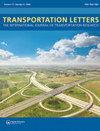通过分解和机器学习预测高速公路车辆检测器的交通流量
IF 3.3
3区 工程技术
Q2 TRANSPORTATION
Transportation Letters-The International Journal of Transportation Research
Pub Date : 2025-02-07
DOI:10.1080/19427867.2024.2339631
引用次数: 0
摘要
交通流预测在交通规划中具有重要意义。目前,交通流数据主要是通过环路检测器采集的。然而,道路状况等因素会影响这些数据的准确性。针对这一问题,本文提出了一种基于分解和机器学习的交通流预测方法。改进的带自适应噪声的全系综经验模态分解(ICEEMDAN)方法将序列分解为多个本征模态函数(IMFs)。利用样本熵(SE)计算每个IMF的复杂度,然后对IMF进行重构。采用鲸鱼优化算法(WOA)对变分模态分解(VMD)参数进行优化,并采用门控循环单元(GRU)进行预测。最后对预测结果进行重构,得到最终预测值。在案例研究部分,使用来自三个检测器的数据集进行实验,探索不同的分解形式和方法。本文章由计算机程序翻译,如有差异,请以英文原文为准。
Traffic flow prediction for highway vehicle detectors through decomposition and machine learning
Traffic flow prediction is of significant importance in traffic planning. Currently, traffic flow data are primarily collected through loop detectors. However, factors such as road conditions can affect the accuracy of these data. To address this issue, this paper proposes a traffic flow prediction method based on decomposition and machine learning. The improved complete ensemble empirical mode decomposition with adaptive noise (ICEEMDAN) method decomposes the sequence into multiple intrinsic mode functions (IMFs). The complexity of each IMF is calculated using the sample entropy (SE), and then the IMFs are reconstructed. Parameters of the variational mode decomposition (VMD) are optimized using the whale optimization algorithm (WOA) for the secondary decomposition, and predictions are made using gated recurrent units (GRU). Finally, the prediction results are reconstructed to obtain the final prediction values. In the case study section, experiments are conducted using datasets from three detectors to explore different decomposition forms and methods.
求助全文
通过发布文献求助,成功后即可免费获取论文全文。
去求助
来源期刊

Transportation Letters-The International Journal of Transportation Research
TRANSPORTATION SCIENCE & TECHNOLOGY-
CiteScore
6.40
自引率
14.30%
发文量
79
审稿时长
>12 weeks
期刊介绍:
Transportation Letters: The International Journal of Transportation Research is a quarterly journal that publishes high-quality peer-reviewed and mini-review papers as well as technical notes and book reviews on the state-of-the-art in transportation research.
The focus of Transportation Letters is on analytical and empirical findings, methodological papers, and theoretical and conceptual insights across all areas of research. Review resource papers that merge descriptions of the state-of-the-art with innovative and new methodological, theoretical, and conceptual insights spanning all areas of transportation research are invited and of particular interest.
 求助内容:
求助内容: 应助结果提醒方式:
应助结果提醒方式:


